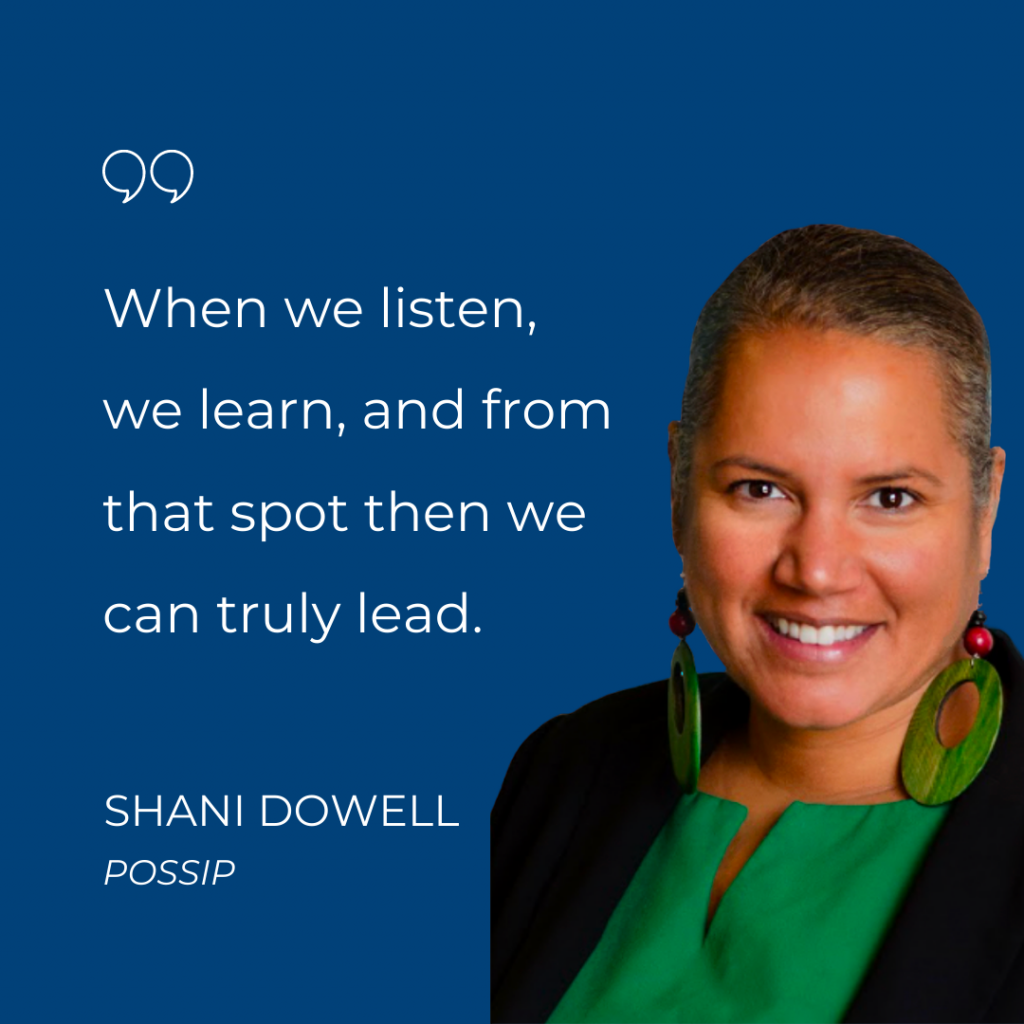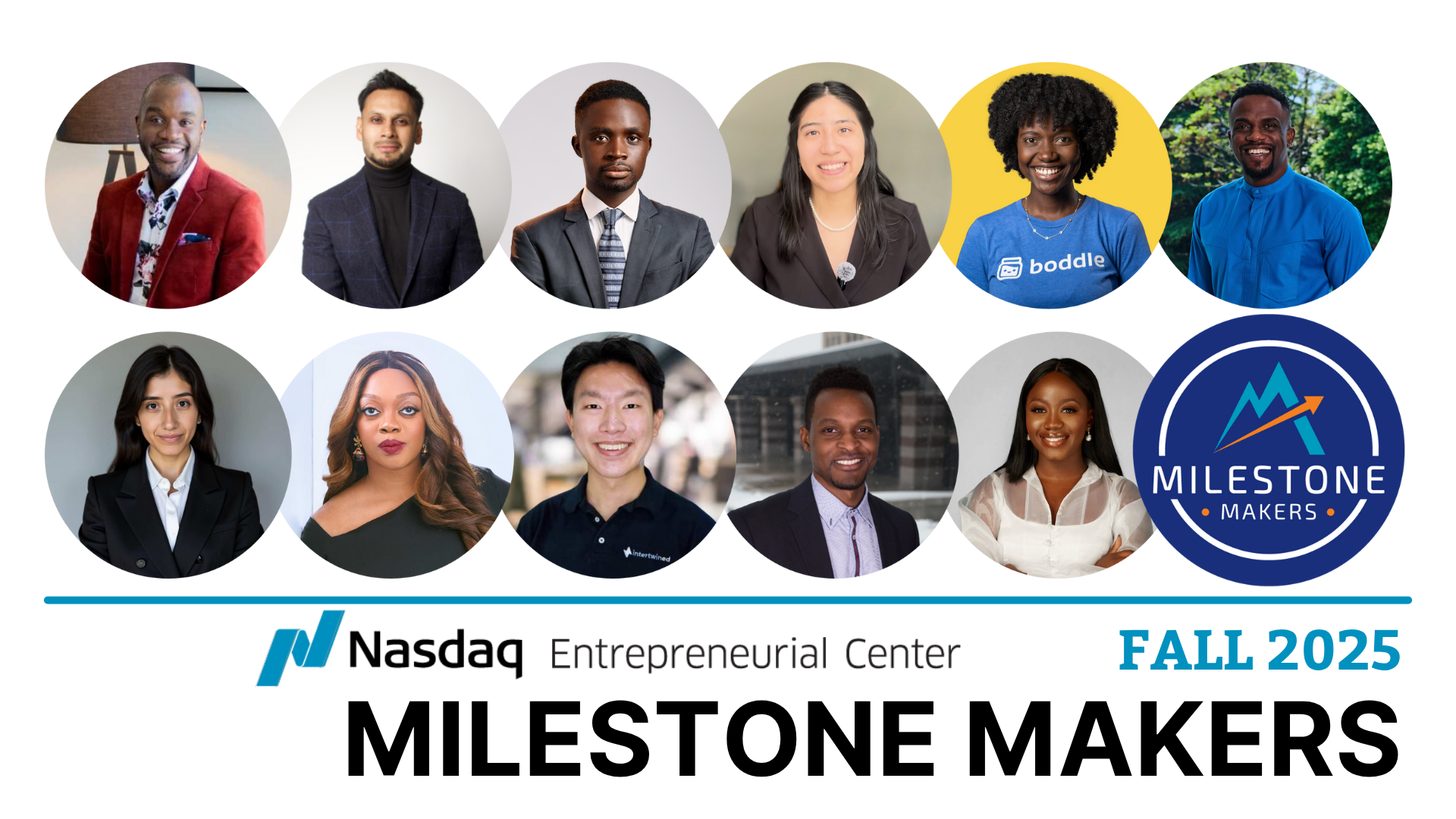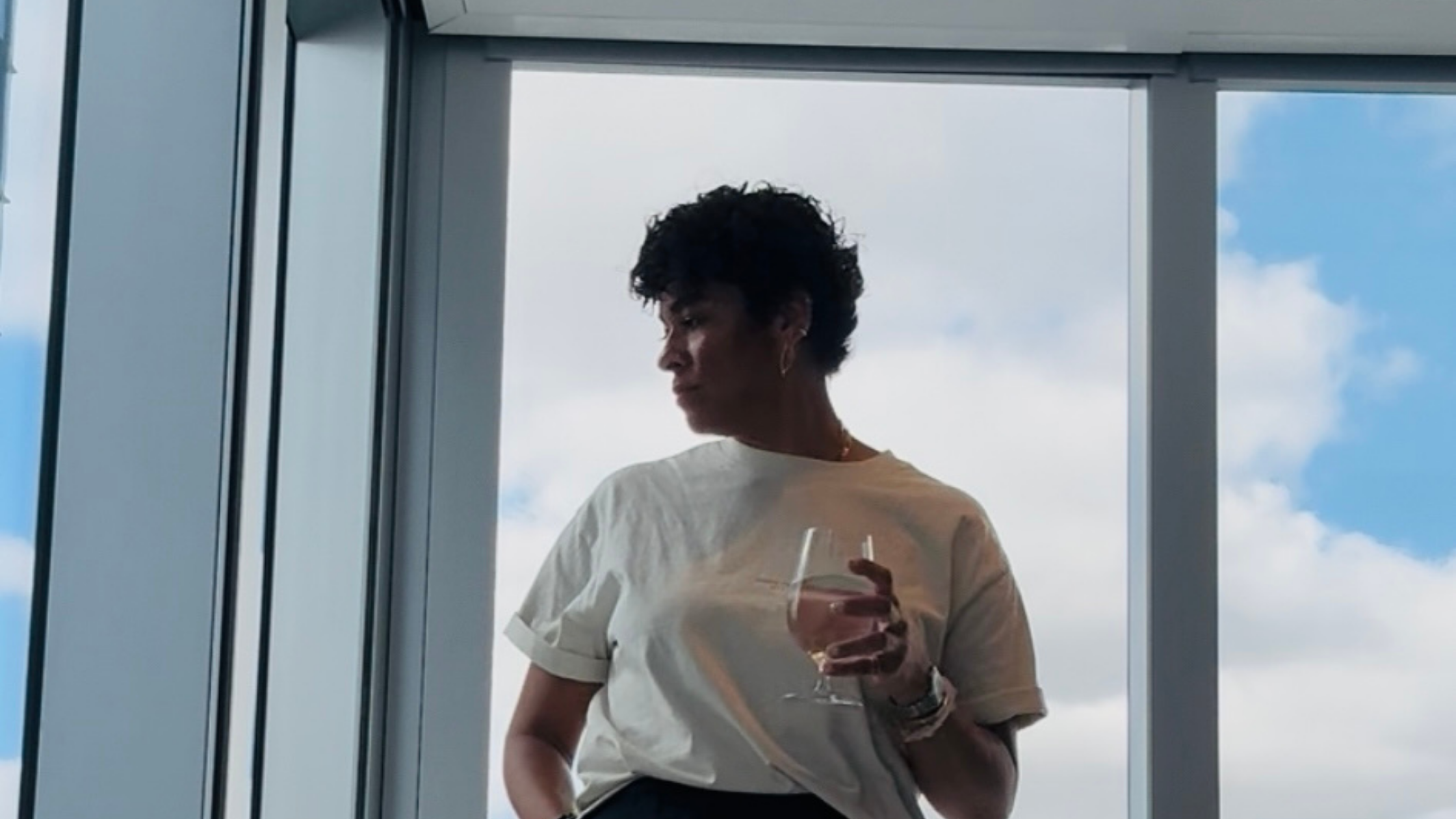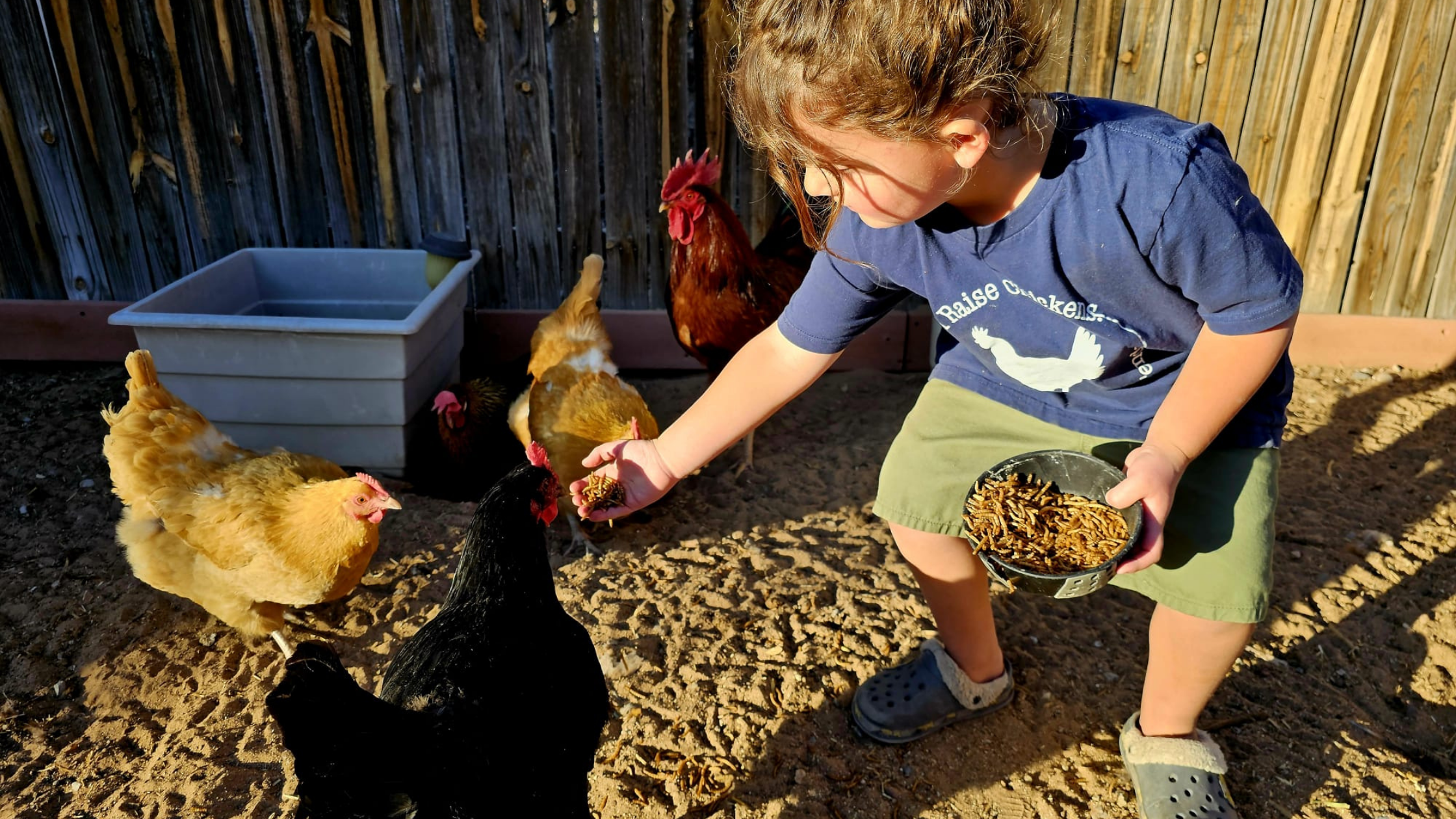Shani Dowell is the CEO and founder of Possip, a parent engagement platform striving to create a feedback loop between parents and schools. Drawing on her experiences as both a teacher and mother, Dowell recognized parents needed a better way to provide praise and feedback to schools and schools needed an efficient way to analyze this data. Since its founding in 2017, Possip has now provided its service—a short, text message “Pulse Check” survey to parents—to over 700 schools in over 100 languages. Dowell’s efforts to eliminate socioeconomic, language, and other barriers to parent-school communication have led to her being the first African-American woman in Tennessee to raise $1 million for a start-up.
What does “entrepreneurship” mean to you?
Shani Dowell: To me, entrepreneurship means seeing a future vision that doesn’t yet exist and taking the risk and doing the work to create it.
How did your company come to be?
SD: One night, I was listening to my husband, who leads six schools throughout Nashville, describe a stressful parent interaction that he had faced. Having previously worked as a teacher, I could empathize with him; but as a parent of two school-aged children, I felt for the parent.
I realized that parents don’t have an easy way to share their concerns—or praise—and schools don’t have an easy way to collect and analyze parent feedback. I also noticed that families with out-of-district addresses or different educational experiences, socioeconomic status, languages, and races faced far greater barriers to having their voices heard within the walls of the school.
I wanted to build a positive bridge between parents and schools that was founded on trust, learning, feedback, and transparency because, at the end of the day, parents need to be heard, regardless of the barriers that may stand in the way.
 How has your business changed in response to the COVID-19 pandemic?
How has your business changed in response to the COVID-19 pandemic?
SD: We realized that our product was really focused on kids being inside the school. With the pandemic, we tweaked our product and our work so that we could focus on supporting families, kids, educators, and schools no matter where their students are physically.
In early March 2020, that started with an increased focus on thought leadership. We quickly realized schools needed easier ways to hear from parents and families amidst school closures.
In addition to gathering feedback, Possip was able to help districts hear families’ needs. Parents could easily communicate technology, food, and other issues impacting their children’s education. Possip has experienced over 500% revenue growth and gained many school partnerships.
What is your proudest and darkest moment so far?
SD: I’d say the darkest moment was about 6 months into working on Possip full time. I no longer had personal income to “bootstrap” and invest in Possip, we had a substantive number of customers we were serving, and outside of technology and part-time team members, I was still taking on all of the work. This meant sales, marketing, customer experience, operations, invoicing, you name it. I had been fundraising and by this point and had, at best, enough money for one more pay period. Fortunately I was so deep in hustle mode, I don’t think I realized at the time how close to the edge I was. I was so focused on putting one foot in front of the other, it wasn’t until a bit of time later that I realized how close to the edge I was. Within a matter of 3 months we had raised enough money for us to hire our first team member, and we’ve continued to grow since then.
I’d say the proudest moment was hearing my team reflect in December or so of this past year. We were looking at the year and remembering March, when COVID first hit. Our team was uncertain what the future held. One of our team members talked about how the uncertainty of our environment had led her to double check to see if her teacher licensure was still effective, just given the risk that was in front of us. But what everyone reflected on was in that moment when the future was so uncertain, everyone leaned in, believed in our product, our mission, and each other. We grew revenue 500%, were able to raise additional money, brought on new team members, and got better in the process.
How is your company changing the landscape?
SD: Historically, EdTech companies have existed to help enable schools and districts to be able to push out information to their stakeholders in an easy and effective way. While this is an important task within any organization, we saw that something even more crucial was missing. Possip is changing the way that districts approach their families and the entire decision-making process by enabling leaders to simply listen.
It sounds almost elementary- but what we’ve seen, not only at the school or community level, but also nationally, is that there is huge power in listening to the voices that we lead. Our schools are more diverse than ever before- and if we can harness the power of diverse voices, we can rethink how education looks – for the good of all those involved.
When we listen, we learn, and from that spot then we can truly lead.
What do you wish you knew when you started? Is there anything you would do differently?
SD: There are a few sayings I’ve heard along the way that really resonate… “20 years to being an overnight success.” I wish I had known that it takes so much more work and steps to achieving your goals than you think at the beginning of your journey.
Other than being patient with myself and the company, I am so glad to learn what I have learned along the way. It is hard to learn without experience. There is a lot that I heard that I wish I had ignored or paid less attention to. Those include some of the narrative popular in Silicon Valley – that you need a tech co-founder, that you should immediately go full-time, that you need to relocate to Silicon Valley, etc. There’s a lot of bad advice out there – or at least I should call it under contextualized advice.
What advice/credo do you live by as you grow the business / what is your professional and personal mission statement?
SD: Put one foot in front of the other and take the next best step. So often seeing the entire path to where you want to get can be overwhelming. A lot of entrepreneurs move slower than they want because they keep trying to run a marathon, instead of taking the next best step. I learned this as a first year teacher. There were many days that were really hard to get up and go – because the previous day had just been so hard. In those moments, I would put my feet on the floor in the morning and say – one step at a time. Through those steps I would eventually get myself to the sink to wash my face, get myself to the gym at 5:30 am, and eventually get myself to the classroom in time to put a smile on my face and greet my students during first period. During the entrepreneurial journey there are many times like that. To think about all you need to accomplish or do – who you need to be – can be overwhelming. So in those moments it helps me to just focus on putting one foot in front of the other and taking the next best step.
Where do you find inspiration when faced with challenges?
SD: I have been part of a few programs including Google for Start-Ups, Nashville Entrepreneur Center programs, StartEd, and a few others. I look to other entrepreneurs and people in these programs when faced with challenges.
I am also inspired by the impact we are having with our customers. Every week we are delivering tens of thousands of parent comments to customers. Being able to deliver those and elevate parent voice and impact schools and districts keeps me inspired.
What does “success” look like for you? What do you think will help you achieve it?
SD: We ultimately aim to be the go-to place for stronger schools, kids, districts and communities. Success looks like us being the place people think of when they want the information, resources, products, or insights to strengthen their children, students, schools, districts, or community.
Achieving this goal will require us to continue to have an incredibly strong team, strong technology, expertise, and relationships.
Has personal or professional “success” changed for you since the COVID-19 pandemic?
SD: We have realized how much bigger our vision as a company needed to expand. With so much pressure put on parents and teachers, we saw that what they were being asked to do versus what they were being resourced to do was unsustainable. That helped us strengthen our conviction to fill that gap.
Many entrepreneurs continue to perfect their daily routines to support their work and greater vision; would you mind sharing your morning routine or a regular ritual that grounds your work each day? How has it changed in recent months?
SD: Every morning I meditate, read a daily devotional, read a chapter from the bible, and journal. I did not have this routine before COVID, I have done it almost every day since. I also got a Peloton I use to workout daily, try to work outdoors when possible, and always pat my kids on their back and put them to bed.
Another grounding ritual is Possip’s daily huddle with our team for 15-30 minutes every morning. This has been great since we don’t see each other often.
What keeps you motivated during this time?
SD: I am motivated by the growth I have seen in myself, my children, my team, and Possip. I also find outdoor time to be a strong motivator.
What kind of an entrepreneur do you want to be known as, as in, what do you want your legacy to be?
SD: A high impact visionary who loved her team and customers and the people they served.
An entrepreneur who took her company’s success and invested it into the future successes of other underrepresented founders
What is a quote or some words of wisdom that help get you through the tough days?
SD:
- I can do all things through Christ who strengthens me.
- 525,600 minutes
These are two that I shared with my students when I was a teacher. They still drive me.
- “Success is not final, failure is not fatal: it is the courage to continue that counts.” – Winston Churchill
- “Nothing will work unless you do.” – Maya Angelou
Have you experienced mentorship in your career? Do you feel it was easily available to you?
SD: Through different programs and investors I have experienced mentorship. At different times it has been harder or easier to come by.
Do you have someone you’d like to nominate to be profiled in our Faces of Entrepreneurship series? Please let us know by emailing media@thecenter.nasdaq.org.




